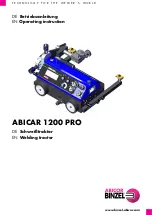
Design and function
MIG/MAG welding
099-005403-EW501
18.08.2016
35
5.3.2
Welding torch and workpiece line connection
On delivery, the Euro torch connector is fitted with a capillary tube for welding torches with a
steel liner. Conversion is necessary if a welding torch with a liner is used!
• Operate welding torches with a liner > with a guide tube.
• Operate welding torches with a steel liner > with a capillary tube.
Depending on the wire electrode diameter or type, either a steel liner or liner with the correct inner
diameter must be inserted in the torch!
Recommendation:
• Use a steel liner when welding hard, unalloyed wire electrodes (steel).
• Use a chrome nickel liner when welding hard, high-alloy wire electrodes (CrNi).
• Use a liner to weld or braze soft wire electrodes, high-alloy wire electrodes or aluminium materials.
Preparation for connecting welding torches with a liner:
• Push forward the capillary tube on the wire feed side in the direction of the Euro torch connector and
remove it there.
• Insert the liner guide tube from the Euro torch connector side.
• Carefully insert the welding torch connector with as yet too long a liner into the Euro torch connector
and secure with a crown nut.
• Cut off the liner with a liner cutter
> see 9 chapter
just before the wire feed roller.
• Loosen the welding torch connector and remove.
• Carefully chamfer the cut off end of the liner with a liner sharpener
> see 9 chapter
and sharpen.
Some wire electrodes (e.g. self-shielding cored wire) are welded using negative polarity. In this
case, the welding current lead should be connected to the "-" welding current socket, and the
workpiece lead should be connected to the "+" welding current socket. Observe the information
from the electrode manufacturer!
















































